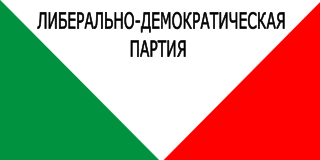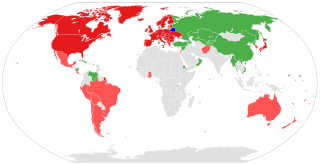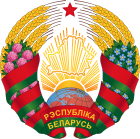
Alexander Grigoryevich Lukashenko is a Belarusian politician who has held the presidency of Belarus since the office's establishment on 20 July 1994, making him the longest-serving European president.

Belarus elects on national level a head of state—the president—and a legislature. The president is elected for a five-year term by the people. The National Assembly has two chambers. The House of Representatives has 110 members elected in single-seat constituencies elected for a four-year term. The Council of the Republic has 64 members, 56 members indirectly elected and eight members appointed by the president.

The Liberal Democratic Party of Belarus, or ЛДПБ (LDPB), is a political party in Belarus. It was created in 1994 as the Belarusian successor of the Liberal Democratic Party of the Soviet Union.

Federal elections were held in Germany on 6 November 1932. The Nazi Party saw its vote share fall by four percentage points, while there were slight increases for the Communist Party of Germany and the national conservative German National People's Party. The results were a great disappointment for the Nazis, who lost 34 seats and again failed to form a coalition government in the Reichstag. The elections were the last free and fair all-German election before the Nazi seizure of power in 1933.

The president of the Republic of Belarus is the head of state and head of government of Belarus. The office was created in 1994 with the passing of the Constitution of Belarus by the Supreme Council. This replaced the office of Chairman of the Supreme Council as the head of state. The tasks of the president include executing foreign and domestic policy, defending the rights and general welfare of citizens and residents, and upholding the Constitution. The president is mandated by the Constitution to serve as a leader in the social affairs of the country and to act as its main representative abroad. The duties, responsibilities and other transitional clauses dealing with the presidency are listed in Chapter Three, Articles 79 through 89, of the Constitution.
Parliamentary elections were held in Czechoslovakia on 26 May 1946. The Communist Party of Czechoslovakia emerged as the largest party, winning 114 of the 300 seats with 38% of the vote. The Communist vote share was higher than any party had ever achieved in a Czechoslovak parliamentary election; previously, no party had ever won more than 25%. Voter turnout was 94%. The national results also determined the composition of the Slovak National Council and local committees.

Presidential elections were held in Belarus on 19 March 2006. The result was a victory for incumbent, President Alexander Lukashenko, who received 84.4% of the vote. However, Western observers deemed the elections rigged. The Organization for Security and Co-operation in Europe (OSCE) declared that the election "failed to meet OSCE commitments for democratic elections". In contrast, election observers from the Commonwealth of Independent States (CIS) described the vote as open and transparent.

A four-question referendum was held in Belarus on 14 May 1995, alongside parliamentary elections. The four issues were the possibility of giving the Russian language equal status with Belarusian, whether new national symbols should be adopted, whether there should be economic integration with Russia and changes to the constitution that would allow early elections if Parliament systematically violated the constitution. According to official results, all four were approved by at least three-quarters of voters, with a turnout of 64.8%.

A seven-question referendum was held in Belarus on 24 November 1996. Four questions were put forward by President Alexander Lukashenko on changing the date of the country's independence day, amending the constitution, changing laws on the sale of land and the abolition of the death penalty. The Supreme Council put forward three questions on constitutional amendments by the Communist and Agrarian factions, local elections and the national finances.

A referendum on allowing President Lukashenko to stand in further elections was held in Belarus on 17 October 2004, alongside parliamentary elections. Lukashenko was nearing the end of his constitutionally-limited two terms, and the change would allow him to run for a third term.

Presidential elections were held in Belarus on 23 June 1994, with a second round on 10 July. They were the first national elections held in Belarus since the country seceded from the Soviet Union three years earlier. The result was a victory for Alexander Lukashenko, who received 80.6% of the vote in the second round. Voter turnout was 79.0% in the first round and 70.6% in the second.

Parliamentary elections were held in Belarus on 15 October 2000, with further rounds of voting on 29 October, 18 March and 1 April. The vast majority of successful candidates, 94 of 110, were independents. Voter turnout was reported to be 61.08% in the first round.

Parliamentary elections were held in Belarus on 17 October 2004, with a second round of voting in two constituencies on 27 October, and a third round in one on 20 March 2005. The vast majority of successful candidates, 97 of 109, were independents. Voter turnout was reported to be 91.04% in the first round.

Parliamentary elections were held in Belarus on 28 September 2008. All 110 seats in the House of Representatives were at stake.

Parliamentary elections were held in Belarus on 14 May 1995 to elect the thirteenth Supreme Council. The elections took place alongside a multi-question referendum, although several further rounds of voting were required on 28 May, 29 November and 10 December. The majority of candidates elected were independents, although 62 seats remained unfilled due to insufficient voter turnout. A total of 2,348 candidates and 22 parties contested the election, around a thousand of which were independents. After the planned two rounds, only 119 of the 260 seats had been filled due to turnouts being too low in some areas. As this was well short of the 174 needed for a quorum, an additional two rounds were necessary. By the fourth round a quorum was reached, and although further rounds of voting were planned for 1996 to fill the remaining seats, following the constitutional amendments made following the referendum and the subsequent formation of a new National Assembly, they were not held.
Parliamentary elections were held in Hungary on 28 and 29 May 1939. The result was a victory for the Party of Hungarian Life, which won 181 of the 260 seats in Parliament and won 49 percent of the popular vote in the election. Pál Teleki remained Prime Minister. This was a major breakthrough for the far-right in Hungary; between them, far-right parties were officially credited with 49 seats and 25 percent of the vote.

The Belarusian Patriotic Party was a political party in Belarus loyal to President Alexander Lukashenko. Nikolai Ulakhovich was the party's chairman.

Presidential elections were held in Belarus on 11 October 2015. Long-term president Alexander Lukashenko ran for his fifth term in office, having won every presidential election since independence in 1991. He was re-elected with 84% of the vote, according to official figures. The 'against all' option received more votes than any opposition candidate.

Parliamentary elections were held in Belarus on 17 November 2019.

The following is a list of the official reactions to the 2020 Belarusian presidential election and the surrounding 2020 Belarusian protests.














